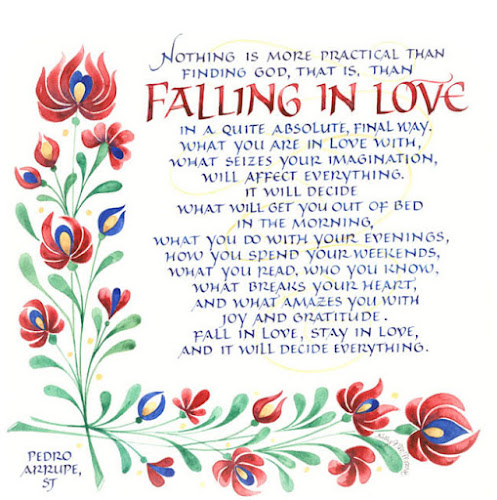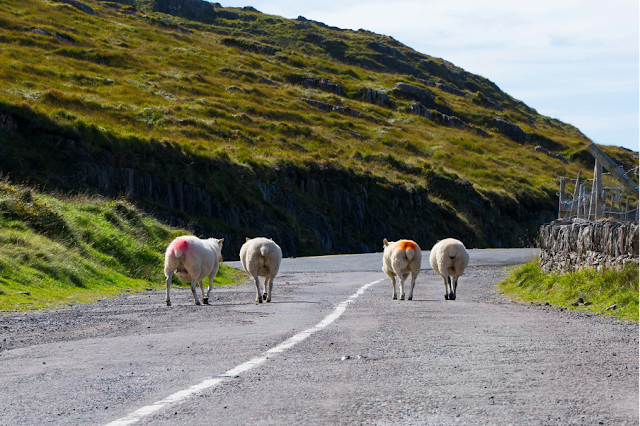What is love?
What is love?
How would you answer the question: What is love?
What the Bible says about love is precise and clear:
God is love.
Love is from God.
To know God is to love. To love is to know God.
We love because God loved us first.
That is what God wants of us ... a heart choosing to love.
What might you take away from this time of prayer?
I offer you one thought to ponder and one challenge to consider.
On St Valentine’s Day this year, during evening prayer with my community, I renewed my vows as a Dominican sister.
I chose to enter religious life because of love of God. That’s not to say that to love God is the same as falling in love with another human being. Neither is it to say that religious are somehow superior, making the better choice. If there are similarities between these expressions of love, there are chasms too.
My friend offers this analogy: imagine finding yourself in a dark room, with no electricity. Which would you prefer: to know that God is with you always or to have somebody sitting by your side, a real flesh and blood person? Which would make you feel more at ease? I know which I would choose!
As a religious, as a consecrated celibate woman, my vow represents a decision to leave an open space - that space filled for others by their love for one person - and to hope that this space can be or is filled by God.
But it’s not a turning my back on love, on friendship, on human contact.
We all need others and we all need to love and be loved - otherwise, we are only a shadow, an empty husk, not a thriving human person. Just like everyone else, men and women religious need close friends and intimacy, hugs and chats, someone to share our struggles and joys with, someone to tell us we are doing ok or to remind us when we need to lighten up or cop on.
Those are all aspects of what love is.
How would you answer the question: What is love?
Even though I know you know what love is, I’m fairly certain that nothing you say will really explain love ... because love is a mystery - it’s something very real and also utterly intangible. When it comes to mystery, words fail us. Yet, here I am, trying to find words - the irony isn’t lost on me.
For days, I have been wondering what on earth I can say about love ... particularly what I might say about love from the perspective of faith.
Since I love Sacred Scripture, I decided the Bible is not a bad place to start!
Depending on which translation you choose, you will find the word love between 300 and 550 times.
That the Bible is full of love is hardly surprising. It is the story of God-with-us, of God who loves and seeks relationship with His people, who guides and saves the people of Israel, and who does the same for us.
In Scripture, we find God-inspired answers to questions about what love is, about what it means to love and to be loved.
But something even greater is revealed: love is not just a concept; love is not just a what but a who. We learn that love has a name. That name is God.
God is love.
Love is from God.
To know God is to love. To love is to know God.
We love because God loved us first.
Our faith enables us to believe that God loved us into being, God’s love sustains us in being, and God never stops loving us.
Our response to God’s immense love is where our challenge lies. At its most essential, our vocation, the ultimate purpose of our life, is to love.
Jesus tells us very succinctly: love God and love others.
It’s that simple and it’s that difficult. Discipleship is fundamentally straightforward and uncomplicated, but it is not for the faint-hearted.
Saint Catherine of Siena, one of our Dominican saints, prayed: “make my heart big, not stingy, so big that it has room in its love for everyone.”
Loving everyone - this is doing God’s will.
This love involves a deliberate choice to serve others and to serve them lovingly.
Choosing to love requires effort - and prayer.
This love is a daily decision, saying yes to God in every moment and in everyone we encounter. We are to see each person as someone loved by God - and we must choose to love them unconditionally.
This is not about treating everyone we meet as our new best friend or adopting them as family or loving them with the intensity of love reserved for a boyfriend or girlfriend, husband or wife. It's about willingness to make time for others, to open our hearts and our ears to them, to be disturbed or inconvenienced.
Our task is to love everyone - including those we would rather not love, or even spend time with. We don’t strive to love such people because we are saints. We do it because we know we are loved by God and are drawn to respond to that love with love. We do it because we know that each of us is the beloved child of God, each of us is God's favoured child. In that we are all equal.
Choosing to love difficult people, and continually making that choice to love them, will not change them, but it will change us.
The more we love, the closer we become to God’s will for us.That is what God wants of us ... a heart choosing to love.
What might you take away from this time of prayer?
I offer you one thought to ponder and one challenge to consider.
If you remember just one thing, please let it be this:
You are loved by God.
Whatever is happening in your life, above all else, know that God loves you.
Know that God’s love for you never lessens.
Even if you do not feel loved, even if you don’t believe you deserve to be loved, God loves you insanely.
Begin to accept how much you are loved.
Even for just a moment, rest in God's love for you.
If you can do no more than that, it’s a good start.
Now, if you’re willing, here’s the challenge:
Accepting how much God loves you, try to live from that love.
When we live loved, we know we are God’s.
To draw on St Catherine again: be who God meant you to be and you will set the world on fire. That fire, of which Catherine speaks, is love.
Knowing God loves us - as we are - frees us. It allows us to be ourselves and it allows us to love others. Living this way, we bring God to other people and bring them to God. Discipleship demands no less of us.
This is a task that takes a lifetime but why not start now?
This Lent, consider the meaning of the greatest symbol of love, the Cross.
This Lent, accept that God so loved the world and that God so loves you.
Live Lent by living loved.
Live Lent by loving.
Try it - because love changes everything!
It did for me. Love changed everything.
When I renewed my vows, a reflection on love formed part of our Evening Prayer. I end with it tonight. My vows free me to respond in love to all God’s people. But, however you will live your baptismal call - single, married, priest, religious sister or brother - your vocation is to love. Note where you find yourself in these words, what resonates with your life, speaks to your heart, stays with you.
(preaching at 'Watch and Pray', St Patrick's Church, Donegall Street, Belfast, 25th February 2020)



Comments
Post a Comment
Thank you for reading my writing. I'm interested to hear your thoughts - please share.